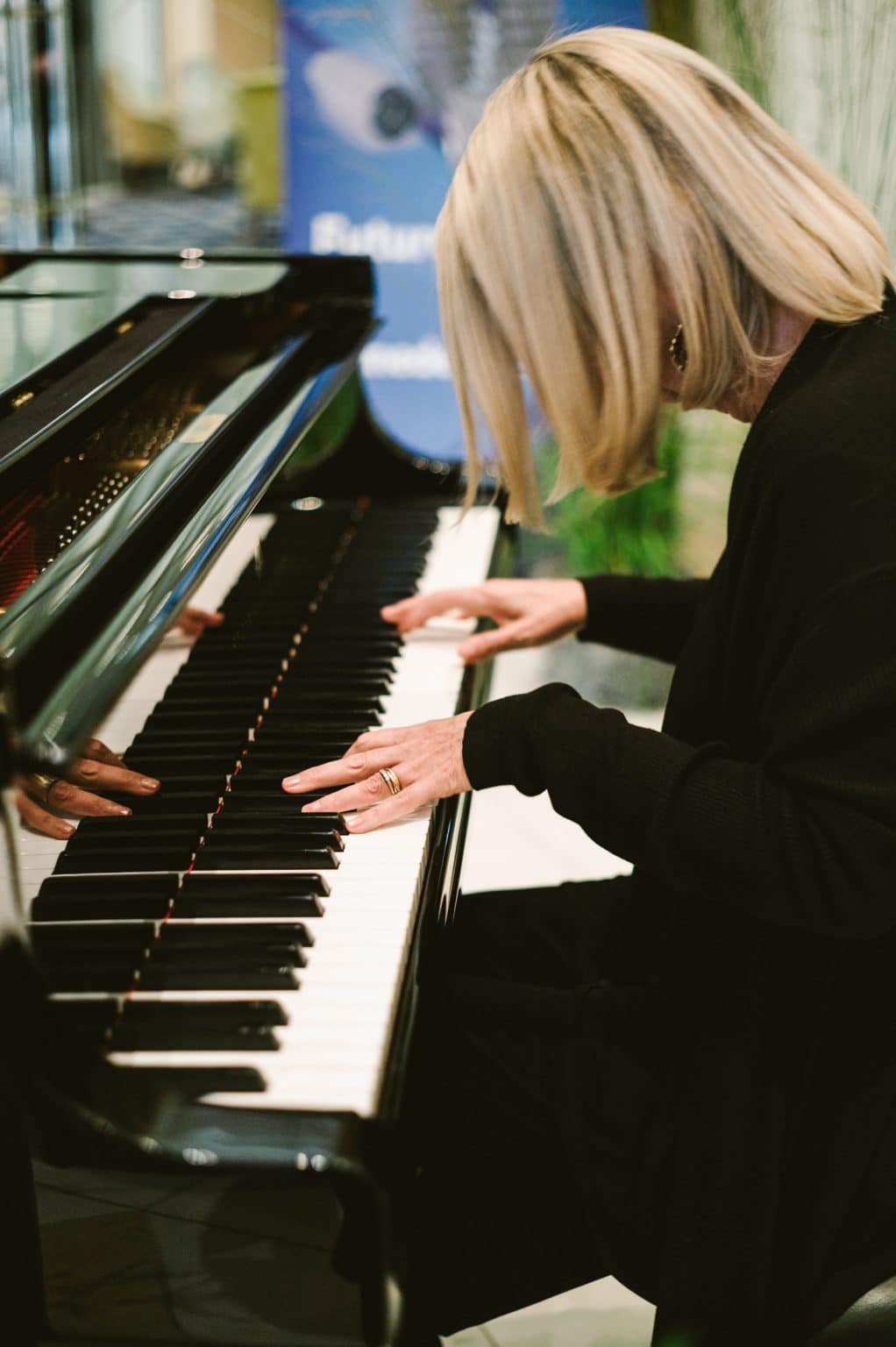Take Me Home, Jimbo
The day after my second concert in South Carolina, I fly through Atlanta on my way to Pittsburgh, where I’m scheduled to perform my Piano Girl program at Chatham University, my alma mater. At this point in my tour I’m less of a Piano Girl and more of a Piano Geezer, but I’m coping.
The show must go on. Curtain up; light the lights. All that.
Pittsburgh, here I come. But first, I must navigate Atlanta’s Hartsfield-Jackson International Airport and find some dinner. Is this an airport or a theme park? About twelve billion restaurants frame the terminal-scape, most of them offering deep-fried mystery tidbits and liquid cheese. I dodge one of the many airport beep-beep cars—supersized golf carts that carry non-walking passengers (dressed for SeaWorld) and threaten to mow down pedestrians (also dressed for SeaWorld). I wonder if there’s a correlation between liquid fake cheese and increased beep-beep car traffic.
I fight for a table in a bistro with plastic chairs and settle for a sixteen-dollar glass of Kendall Jackson Chardonnay served alongside a soggy salad drizzled with diesel fuel.
Uptown problems, all of them. I am fine, just tired. I whine about wine when I run out of steam. At least my dinner comes on a plate and I don’t have to stand up to eat it. At least I’m not a refugee mother with two children stranded in airport jail waiting to be deported back to a country where chemical bombs are the weapon du jour.
Shape up, I tell myself.
I see six bloated people stuffed in a beep-beep car wearing “Make America Great Again” hats. I wonder where they’re going. Nowhere fast. Epcot, maybe.
Get me out of here.
My flight touches down in Pittsburgh on time—well done, Delta—and I successfully contact my Uber driver. Jimbo, wearing a plaid flannel shirt and a baseball cap covered with Steeler buttons shows up in a no-color Toyota. He pulls on his beard, grunts at me, and looks like he would rather be hunting. I wonder if there’s a rifle in the trunk.
Jimbo drives cautiously. I do not get carsick. Always a plus, especially for Jimbo.
Our car reaches the end of the Fort Pitt tunnel and wham! There’s the Golden Triangle. I’ve been away from Pittsburgh for almost forty years, but the dazzling, jagged skyline reminds me that this peculiar city still feels like home.
“Bootiful, ain’t it?” says Jimbo.
Mark Twain, describing Pittsburgh, once wrote: “With the moon soft and mellow, we sauntered about the mount and looked down on the lake of fire and flame. It looked like a miniature hell with the lid off.”
Twain never met Jimbo.
Hey, yinz guys. I’m back.
Mrs. Brockett
Leslie Brockett is eighty-two—twenty-three years my senior—but one of the most youthful women I know. We met during my college years, when I worked for her husband, Pittsburgh producer Don Brockett. Leslie remains a stable force in my life. She picks me up at my hotel and whisks me to Shadyside where we have lunch at Casbah, a fancy-pants place where you sit in a tent and eat scallops.
Funny thing about my dear friend Leslie—I can be away from her for months, even years at a time, but our conversations—about politics, interior decorating, art, or food—pick right up where we left off. I last saw her in August, before the November political pratfall that placed our country in the smallish hands of a large-ish buffoon. Back then we were hopeful; now we feel doomed. We yap for hours on this topic, poking at what-ifs and why-nots and wondering if Trump supporters, some of whom appear to be decent people, are racist or stupid or both. Then we go to Talbot’s and shop the sale.
Later, we head to Mount Washington. Leslie’s splendid Chatham Village home features an antique carousel pig, some Dutch paintings of sheep, French-country furniture in sun-faded shades of butter and burgundy, and a cat named Boy. We talk into the night and cry our eyes out while streaming the film Moonlight. We say it’s the most important film of the year, especially in this fraught political climate, but agree that it will never win an Oscar. Moonlight tackles big themes by examining small, burdened lives. Too good to win? Seems to be a theme this year in the USA. Quality, in some circles, doesn’t cut it anymore.
I spend the night on Leslie’s down-filled sofa, wrapped in soft linen sheets trimmed with handmade lace. Boy stretches and rifles through my suitcase, looking for catnip toys.
Three days until the concert.
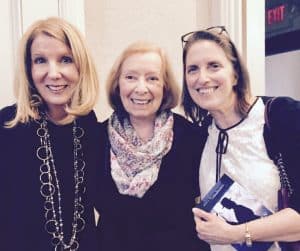
The James Laughlin Music Building
Thursday morning I head back to Chatham and read through my script. I’ve put together a new program for the hometown crowd.
Bob and Ann, my parents, arrive at noon. We drive over to the James Laughlin Music Building where we meet Professor Pauline Rovkah, the Ukrainian-born pianist who runs the small music department at Chatham. Sprightly Pauline, wearing a bright yellow dress with matching shoes, looks like a bead of sunshine dropped onto the campus tableau. My black travel clothes weigh me down as the early spring light, fluid and startling, floods the February afternoon.
We enter the building—a hallowed hall haunted by discordant melodies from my past. Pauline shows me several pianos, but the only one suitable for the concert is a 1976 Steinway “D,” the very instrument I played while attending the school almost forty years ago. Back then it was brand new. So was I.
Pauline, whose frothy enthusiasm for music swells and crests like the Black Sea on a windy day, talks a mile a minute (tempo tantrum), and Bob—never one to shy away from a conversation—provides a Pittsburghese counterpoint to her Ukrainian-American chatter by inserting his own funny stories about gigs gone awry. The two of them natter on in the corner while I reacquaint myself with the Steinway. They are either trading stories about mutual Pittsburgh Symphony friends or sharing Borscht recipes.
This piano. Hello old friend; it’s been awhile. Like, four decades. Ah, I remember. A glistening upper register and a brawny bass. Kind of boggy in the middle. So it goes. The technician will arrive tomorrow.
I play. A mixed bag of recollections rips open and spills onto the keyboard. The sacred air inside this place, once home to my early piano frustrations, pulses with the hushed energy of music students past and present.
The piano lures me back to 1976 like a hand-cranked time machine. An audio track of musical train-wreckage—anxiety attacks, fretful lessons and awkward recitals—rewinds in my mind. I studied many things at Chatham, but they had little to do with piano technique or artistic integrity. Mainly, I learned how to celebrate failure—how to take scraps of broken songs and stitch them into the patchwork of imperfect music I want to hear. It has taken me four decades and a lot of multi-continent piano-hopping in non-sensible shoes to figure this out.
Freshly painted in shades of cream and taupe, with towering windows overlooking slanted trees, the James Laughlin Music Building feels like an airy atelier haunted by the singing, taunting ghosts of my youth. I wait for Voice of Doom to mess with me, but he’s over there in the corner, buzzing around Pauline and Bob.
I focus on the keys so I don’t start sweating. Or crying. Two days till the concert.
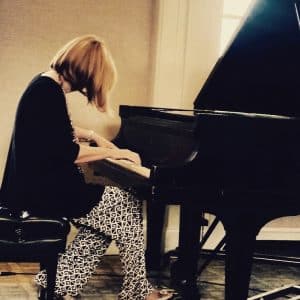
Randita
My sister, Randy, greets me outside her restaurant, Randita’s Organic Vegan Café, wearing her chef’s black smock. Randy has closed the place this evening so she can prepare for tomorrow’s catering event—vegan lasagna for eighty—and I am here to keep her company while she slices, dices, and stirs.
Randy’s husband, Dale, says hello and shows me his new guitar set-up in the corner of the restaurant. He runs the place with Randy during the week and performs on the weekends. Dale plays and sings “Walkin’ in Memphis” and I have one of those I remember that song moments of pure joy. Then he plays Willie Nelson’s “Valentine” and I envision weak-kneed female diners falling headfirst into plates of vegan shepherd’s pie.
No one can work wonders with fake chicken (chickun) the way my sister can. Her food tastes like a plant-based version of my childhood. Her music skills are limited—Randy’s one piano number is a march-tempo arrangement of “Eleanor Rigby”—but boy, can she cook. I’m proud of my sister. A survivor of domestic abuse, she raised four kids on her own and reinvented herself—at the age of fifty—by opening a vegan restaurant that has become a “go-to” place in a hip part of town. She found true love, married Dale the Guitar Guy, and has steered her boys to adulthood by providing a home filled with good food and love. She’s walkin’ in Memphis every single day.
Randy whips up some pea soup and we talk for hours about our kids, our parents, our shared good fortune. I wish I had her tenacity, she wishes she had my chill. If you mixed the two of us into one woman, you’d get a vegan-musician pit bull with a cranky stomach who takes a lot of naps.
One day until the concert.
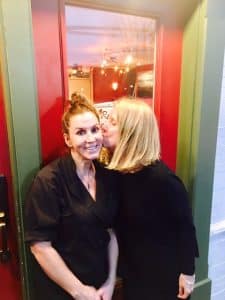
Roses and Daffodils
Debra McCloskey was one of my roommates at Chatham. Debra comes from Ellwood City, Pennsylvania, where she was a local hero for having won the Lawrence County Junior Miss Pageant. The day she won, the Ellwood City newspaper ran a two-inch bold headline that said:
Debbie McCloskey wins Junior Miss!!!
At the bottom of the page, in fine print, was the single sentence:
Richard Nixon Resigns—story page 6
At Chatham, Deb was a political science and theater major. She had grown up in a blue-collar working-class home. Deb thought my family was rich because we had matching towels in the bathroom. I thought she was rich because she had an entire town worshiping at her feet.
My other roommate, Peggy Melozzi, was a Heinz Scholar with an English and theater double-major. She spent a semester at Oxford and was—and still is—a brilliant actor and writer. Back in 1976, I felt like the campus idiot around Peg and Deb, but their determination and ingenuity—during a time when I was obsessed with Carole King songs, spandex evening gowns, and Benson and Hedges Lights—gave me a much needed academic nudge.
Deb and Peg were frequent guests at my Hyatt piano gig. They sipped Tab and listened to me play, their shining eighteen-year-old faces beaming out at me from the smoky recesses of the lounge. They thought I was glamorous. I thought they were true intellectuals.
Today, forty years later, I’ve got them back for the afternoon.
We meet in Shadyside—back to the Casbah!—and try to make sense out of our crazy, busy lives. Deb is now a Pennsylvania Supreme Court Justice; Peg writes and produces corporate films. When we were nineteen we had a nightclub act called “Ladies” that we were sure would catapult us to stardom. Slight problem: Deb was the only one who could sing.
We rehearsed day and night, night and day. We thought we were great. Twenty-four hours before our first booking we scheduled a dress rehearsal. The only invited guest was a rather messy girl named Rita, a friend of Peg’s. Rita was the smartest girl in the school, and we were sure she’d be able to give us some constructive criticism. About halfway through our dress rehearsal, after we had brayed our way through a song from the musical Shenandoah called “Freedom,” Rita stood up and said—very calmly—“This is horrible.” Then she walked out.
We chose to ignore Rita, our parents, our music teachers, and our own common sense. We went on with the show.
Over the years Peggy Melozzi has said some funny things, but my absolute favorite? This, uttered with mild disgust in 1977, after realizing that our crack agent had advertised us at the Oakdale Army Support Base as snake-dancers: “I don’t know what snake-dancers do, but I’ll bet they don’t open with ‘Everything’s Coming Up Roses.’ ”
At lunch today we wonder whether we should consider doing a revival tour with our sixty-year-old selves singing tunes like “The Party’s Over,” “Time to Say Goodbye,” or “Water Retention Blues.” A comeback from careers we never had, complete with extra-large tour t-shirts (in slimming navy blue) that say Ladies: Last Chance. Instead of army support bases and Elk lodges, we could wear army support hose and perform in nursing homes, where we are still considered hot warm young things.
Instead of Danskin body suits we could wear caftans with bling. Think Zsa-Zsa.
We visit the Chatham campus and make our way to our old dorm room at Berry Hall, recently taken over by the admissions department. There’s an oversized desk where my bed used to be and a printer in the spot where Peg once slept.
“Where’s the tub?” asks Deb. “Where’s the Swamp?” Our private bathroom, plenty big enough for a mattress when we had visitors, always smelled vaguely marshy. Three freshly scrubbed young women now work in the Swamp, blissfully unaware of the debauchery that once occurred on that soggy floor. I swear I can still smell the mildewed carpet.
So much has changed here. Chatham went co-ed two years ago and young men play Frisbee on the campus green. The post office has moved; the Benedum mansion has been sold and turned into condos; the old swimming pool and bowling alley in the Andrew Mellow house are now conference rooms. The theater department is defunct, and a huge athletic center has sprung up behind the cafeteria, complete with a climbing wall. There are no female students climbing on the climbing wall. Maybe they’re in the library.
I’ve become a cliché—a middle age woman stewing over change. But in spite of the campus transformation, one key element feels the same as I stroll past the science building with these two remarkable women. I feel safe. And buoyed by their girlish love and loyalty.
It has taken me decades to appreciate the beauty of our college-girl bravery; our naive willingness to sing and dance and act like fools and just assume that the whole world would want to watch and listen. Where does that courage go when we grow up? Maybe it floats out the door one day when we’re not paying attention, and is gone forever. Or maybe it lurks outside, just around the corner, searching for a way to sneak back into our lives, through a window we’ve forgotten to close. I hope so. I still check my windows every day, and leave them open, just a crack.
We were great together. We still are.
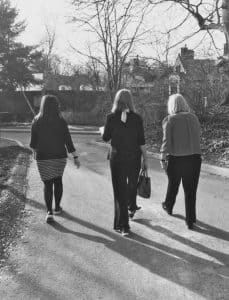
The Concert
Bob picks me up early and we head to the hall, a three-minute drive up Woodland Road. I’ve been performing in Europe all these years and my parents have never seen my concert program.
“Exactly what are you going to play?” he says, glancing skeptically at my sketchy set list.
Once a dad, always a dad. He takes charge and loads in all of my merchandise. He has also schlepped an “extra” sound system in case the university system isn’t up to par.
“Students pay 40,000 a year to go to this place,” I say. “They should have a decent sound system.”
“You never know,” Bob says. “These places promise good sound and then you end up sounding like Elmer Fudd on helium. I’ve got you covered.”
Professor Pauline, in another Pittsburgh early-spring outfit—this time Easter grassy-green—latches onto Bob again. This gives me a chance to warm up, while Bob paces and worries about gypsies, tramps, and thieves. Dad is concerned about ticket sales at the door—who will collect the money, who will sell the merchandise, who will watch out for criminals and rogue audience members looking to shoplift my CDs and books.
“Dad,” I say. “In all the years I’ve been doing this no one has ever stolen anything.”
“Yeah, “he says. “But you live in Europe. Things are different over here.”
“Sometimes people leave extra money,” I say. “I even use the honor system—anyone who doesn’t have cash can pay later.”
Bob responds by raising one eyebrow. He has obviously been in the jazz business for too long. “Really?” he says.
“Really. CDs featuring tunes like “Greensleeves” and “Spring Can Really Hang You Up the Most” are not black-market heist items. I wouldn’t worry too much about security.”
People are starting to show up and it’s still an hour until show time. We’re sold out. I finish my warm-up, exit stage left, and hole up in a smaller recital hall. In spite of the barricade I’ve constructed with a couple of music stands, the door keeps slipping open, each time revealing a pop-up person from my past. I need to go into prison mode and stop talking. I’m usually not this sensitive before a show, but a hometown performance has a lot of unclaimed baggage attached to it.
Deb shows up in my dressing room and puts her hands on my shoulders. “I am here to help,” she says. “Anything you need, I am here for you.”
I burst into tears and thank her. “Keep everyone out,” I say.
“You got it,” says Deb. She puts on her Justice face—smiling but firm—and heads out to run interference. I calm down, guzzle a liter of water, and prepare.
Twenty minutes later Bob knocks over the music stand barricade and crashes into the room. “You ready?” he says. “Everyone is here.”
“Ready,” I say.
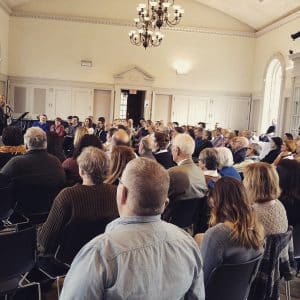
I listen to my introduction, make an entrance, and take a diva bow. The hall, filled with people from diverse phases of my life, feels like an intersection of then and now. It feels like home. It occurs to me that this might be the same audience that would show up at my funeral. I’ve had the funeral sensation before but for entirely different reasons—like the time a ninety-year old woman fell asleep in the front row during the first five minutes of my show, snored loudly, then woke up and shouted: “IS SHE DONE YET?”
I announce that the Steinway is the same piano I played in 1976; back when it was brand new.
“And I paid for it,” yells Bob from the front row. I have one heckler in the audience and it’s my father. Perfect.
I read my “Ladies” story, a story about a choking priest at the Redwood Motor Inn, and a story about my short-lived career as a piano-playing stripper in one of Don Brockett’s shows. We roll along and have a lot of fun—I’ve chosen tales that feature members of today’s audience. High school friends, college classmates, and teachers; Mister Rogers Neighborhood alumnae—including Neighbor Aber, Mayor Maggie, and Speedy Delivery Mr. McFeeley; musicians and actors from far and wide; childhood friends I haven’t seen since 1980. They’re all here.
As we come to the end of my program, I read this text:
I don’t have to return home to hear the musical voices of my Pittsburgh childhood. All I have to do is sit down and play. Every time I touch the piano, my teacher, Bill Chrystal, is there, reprimanding me for a careless mistake or sloppy fingering. Sometimes, not often enough, I catch myself playing a passage the way he would have played it, clear and full of life, and it takes my breath away.
I watch reruns of Mister Rogers’ Neighborhood and hear Johnny Costa playing, Fred Rogers singing, and my dad backing them up with his tasteful percussive nuances and perfect time. Watching that show is a melodic time tunnel, a chance to revisit the playing and composing giants of my youth.
Fred and Johnny, along with Bill Chrystal, Don Brockett, and my father have left behind a billion notes, a dizzying number of beautiful thoughts transposed into song, and a musical tapestry woven with threads of optimism and inspiration. I’m reminded that each supportive person in a young person’s life—college music professor, parent, or friend—carries a torch that can spark the artistic flame that lives in every child’s heart.
I try to stay composed, but I get weepy as I near the end of the passage. So many of my heroes are gone. Of all the musicians I mentioned, Dad is the last one standing. And playing. Go, Bob.
When I start back to the Steinway, my mother reaches out from the front row and hands me a Kleenex. I am almost sixty years old, and my mom still makes sure I don’t get caught in a public place with a runny nose. Amused, exhausted, and extremely grateful, I float through the last song of the set.
Take me home, Jimbo. It’s bootiful here.
**
Coming in May: “I’ll Take Manhattan,” Part 3 of the Peripatetic, Poetic, and Chic series.
Many thanks to Bob and Ann Rawsthorne, Leslie Brockett, Pauline Rovkah, Dana DePasquale, Randy & Dale Cinski, Trey, Beau, & Cole Turnblacer, Debra Todd & Peggy Melozzi, Chatham University, Randita’s Organic Vegan Café, the old gang from Chatham Village, and all the wonderful people who showed up to celebrate music. I love you all.
Robin Meloy Goldsby is a Steinway Artist. She is the author of Piano Girl; Waltz of the Asparagus People: The Further Adventures of Piano Girl; and Rhythm: A Novel.
New: Manhattan Road Trip, a collection of short stories about (what else?) musicians. Go here to buy Manhattan Road Trip!
Sign up here to receive Robin’s monthly newsletter. A new essay every month!

